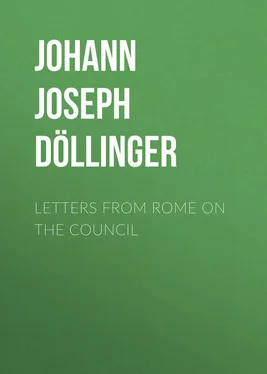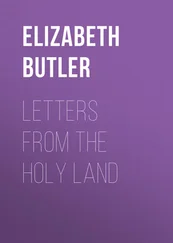Johann Döllinger - Letters From Rome on the Council
Здесь есть возможность читать онлайн «Johann Döllinger - Letters From Rome on the Council» — ознакомительный отрывок электронной книги совершенно бесплатно, а после прочтения отрывка купить полную версию. В некоторых случаях можно слушать аудио, скачать через торрент в формате fb2 и присутствует краткое содержание. Жанр: foreign_antique, foreign_prose, на английском языке. Описание произведения, (предисловие) а так же отзывы посетителей доступны на портале библиотеки ЛибКат.
- Название:Letters From Rome on the Council
- Автор:
- Жанр:
- Год:неизвестен
- ISBN:нет данных
- Рейтинг книги:3 / 5. Голосов: 1
-
Избранное:Добавить в избранное
- Отзывы:
-
Ваша оценка:
- 60
- 1
- 2
- 3
- 4
- 5
Letters From Rome on the Council: краткое содержание, описание и аннотация
Предлагаем к чтению аннотацию, описание, краткое содержание или предисловие (зависит от того, что написал сам автор книги «Letters From Rome on the Council»). Если вы не нашли необходимую информацию о книге — напишите в комментариях, мы постараемся отыскать её.
Letters From Rome on the Council — читать онлайн ознакомительный отрывок
Ниже представлен текст книги, разбитый по страницам. Система сохранения места последней прочитанной страницы, позволяет с удобством читать онлайн бесплатно книгу «Letters From Rome on the Council», без необходимости каждый раз заново искать на чём Вы остановились. Поставьте закладку, и сможете в любой момент перейти на страницу, на которой закончили чтение.
Интервал:
Закладка:
The drawing up of the letter of remonstrance at Fulda is said not to have been such plain sailing. The Pastoral originally sketched out by Heinrich, Canon of Mayence, but to which important additions were made subsequently, was subscribed by all the Bishops, even those who had been pupils of the Jesuits, who consoled themselves with the belief that the dogma of Infallibility did exactly combine the conditions specified there as requisite for a dogmatic decree, and was really scriptural, primitive, and written on the hearts of all good Catholics. So their Jesuit masters had taught and assured them. But the secret document sent to the Pope had necessarily to be more explicit, and though it was limited to pointing out how inopportune the definition of new dogmas, especially of Papal Infallibility, would be, that was precisely opposite to what the Jesuitizers among the Bishops were convinced of. The Jesuits themselves lose no opportunity of proclaiming that nothing can be more opportune than this dogma, and from their own point of view they may be right enough, for the rich and ripe fruits of the dogma would fall into their own laps, and would help the Society to absolute dominion over science, literature, and education within the Catholic Church. The proposed dogma would give canonical authority to the Jesuit theology, and identify it with the doctrine of the Church, and the Order, or the spirit of the Order, would always be required for teaching and vindicating the new system. The Bishops of Paderborn and Würzburg therefore refused to sign, and the representative of the Bishop of Spires followed their example.
The scruples of these Northern Bishops were so utterly unexpected that they must have created great surprise at Rome. Their informant in the matter of the Infallibility dogma had assured the authorities, in the teeth of the Northern Prelates, and with the full concurrence of all the members of the Commission, that no fitter or more favourable time could be found for establishing the new dogma, for at no former period could the Court of Rome reckon so securely on the unconditional devotion of the Bishops, nor was there ever a time when they were so ready as at this moment to surrender before the Pope all exercise of their own judgment or independent examination. The remonstrances of the Hungarian, Bohemian, and German Bishops have of course poured water into this wine, to the no small astonishment and indignation of the Roman Prelates, with whom it is an axiom that nobody is a good Christian who does not believe the infallibility of the Pope as firmly as the divine mission and truthfulness of Christ. Accordingly, the Correspondance de Rome cast in the teeth of Prince Hohenlohe, that since all true Catholics already hold the infallibility of the Pope when speaking ex cathedrâ , a decree of the Council will only confirm what is universally known and believed. 9 9 Corresp. de Rome , 1869, p. 384: “L'infallibilité du Pape, décidant en matière de foi ex cathedrâ , c'est-à-dire comme maître de l'Eglise étant déjà admise par tous les vrais catholiques, un décret du Concil fera juste l'effet d'une confirmation d'une chose universellement sue et crue.”
Let those good souls who flatter themselves that the Civiltà , with its expectations and demands, stands alone, weigh well the utterances of so well-known a journal.
The Austrian Bishops have not thought it well to follow the example of their Hungarian, Bohemian, and German colleagues. One of them, Dr. Fessler, is notoriously the most determined advocate of the whole ultramontane system, and was the first Bishop to declare the definition of the new dogma to be at once a natural and suitable work for the Council. His services were promptly rewarded; he is already named chief secretary of the Council, and his hand will press heavily on its decrees. The Curia may congratulate itself on its choice. The silence of the Austrian Bishops is further explained by the differences of opinion among them about the questions coming before the Council.
In their secret letters the Northern Bishops have opposed the new definition only as being inopportune, and it is known that the French Opposition Bishops mean to take the same ground. But it deserves careful consideration whether this line of action can be really tenable or effective at the Council. Surely it may be certainly foreseen that the far more numerous, and, from its determined attitude, stronger party on the other side will answer, “If your only objection to the dogma is that it is unsuited for the times, you thereby admit its truth; for if you thought it doubtful or erroneous, you must have opposed the definition on that ground. By not venturing to assail its truth, you deprive your objection to its opportuneness of all weight, for when was ever a religious truth, on which eternal salvation depends, suppressed on such a ground as this? Does this holding back, inspired merely by fear of men, correspond to the ancient spirit and lofty mission of the Church? How many of her doctrines would she have dared to proclaim if she had chosen to wait on the approval of the age? Rather, for that very reason, must religious truths be loudly and emphatically proclaimed, when a contrary opinion is growing among men, because thereby an insidious heresy is marked out and judged by the supreme authority in the Church. Your plea of inopportuneness is therefore a fresh and urgent ground for adhering firmly to the solemn definition of Infallibility by the Council.”
How far better then would it be if these Prelates were to declare simply and directly, what the German Bishops have indeed said in their Pastoral, but, of course, in general terms only, and without express mention of the Infallibilist hypothesis; “This doctrine possesses none of the requisite conditions of an article of faith; it has no guarantee either of Scripture or Tradition, and no roots in the conscience and religious mind of the Christian world.” Such a line would be incomparably worthier of the Bishops, and would make their position far stronger and more unassailable. Instead of letting themselves, as is intended, be yoked, like willing prisoners, to the triumphal chariot of the sole infallible and sole defining Pope and lord, they would be making a beginning for the revendication of their ancient apostolical rights, which the Papacy has sequestered or robbed them of. They would be asserting, by implication, that the Papacy and the Church are not identical, and therefore that the Church cannot be made responsible for all decrees and actions of the Popes. Half-and-half courses, and false piety, in the tremendous crisis the Catholic Church is now entering upon, are not only powerless but fatal. And this half-heartedness, which looks only too like fear, will make the Ultramontane and Jesuit party all the bolder and stronger in their plans. And they continue still as firm as the rock of Peter. In the number for Oct. 2, p. 64, the Civiltà maintains, against a new French paper, the Avenir Catholique , that the relation of the Bishops assembled in Council to the Pope is simply one of most absolute subjection and obedience to Papal commands, and declares, on the authority of Ferraris, who is a classical authority at Rome, what is meant by præsidentia auctoritativa , viz., the Pope's right, not only to decide on everything, but to coerce all opponents, by ecclesiastical censures – excommunication, suspension, and deposition – and other judicial means. 10 10 “Præsidentia auctoritativa dicitur … insuper cum auctoritate coactivâ compescendi etiam per censuras ecclesiasticas, et alia juris media contradictores et rebelles et contumaces, prout ex constitutione xi. Martini v., etc.”
If the Pope strikes down every contradiction or refusal of a Bishop at once, with the thunderbolt of his anathemas, according to the Civiltà he no more violates the freedom belonging to the Fathers of the Council, than a man who keeps within his own rights in his dealings violates his neighbour's rights of property. We must remember, as to this definition of freedom, that the logic of the Jesuits has always gone its own way without troubling itself with the logic of the rest of mankind.
Интервал:
Закладка:
Похожие книги на «Letters From Rome on the Council»
Представляем Вашему вниманию похожие книги на «Letters From Rome on the Council» списком для выбора. Мы отобрали схожую по названию и смыслу литературу в надежде предоставить читателям больше вариантов отыскать новые, интересные, ещё непрочитанные произведения.
Обсуждение, отзывы о книге «Letters From Rome on the Council» и просто собственные мнения читателей. Оставьте ваши комментарии, напишите, что Вы думаете о произведении, его смысле или главных героях. Укажите что конкретно понравилось, а что нет, и почему Вы так считаете.












